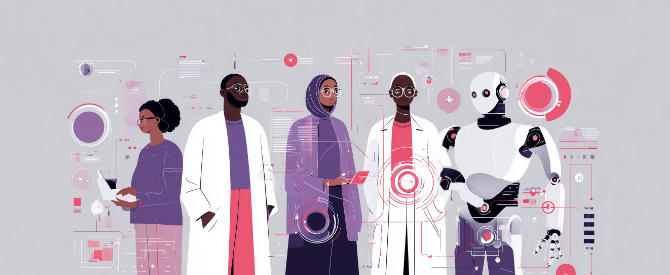
By Thabo Peyi
July 15th, 2025
4 min read
Empathetic AI: Helpful Ally or Hollow Comfort?
The rise of artificial intelligence has taken the world by storm, impacting everything from our working lives to our daily routines. AI can now be used for almost anything – from autonomous vehicles and designing workout plans tailored to your needs, to assisting with assignments and emotional support. Even Google has integrated emotional AI to enhance user experience. It feels as though you can’t go anywhere without encountering AI.

With tools like ChatGPT and Gemini being used not only for productivity but also as emotional support AI, an important question arises:
Can artificial intelligence understand human emotions, or is it just faking it?
Related
Categories
All
Entertainment
Self Help
Tech News
Company Updates
Community
Social Media

What Is Empathy?
To understand this topic further, we must first explore what empathy is – both emotional empathy and cognitive empathy.
- Cognitive empathy is the ability to understand another person’s perspective and recognise what they are feeling.
- Emotional empathy, on the other hand, involves actually feeling those emotions yourself.
For example, when a friend breaks up with a partner, cognitive empathy means you understand their sadness. Emotional empathy is feeling that sadness with them. These human qualities help build strong emotional connections – something AI simply can’t feel.

Can Artificial Intelligence Fake Empathy?
Artificial intelligence feels nothing, but it can simulate empathy well. So how does AI mimic human emotion?
By analysing vast amounts of historical data and recognising human behaviour patterns, AI tools can exhibit simulated empathy – recognising and responding to emotional cues. This process mimics cognitive empathy, allowing AI to shape tone, choose comforting words, and even pause strategically to sound more “human.”
Think of:
- A chatbot that says, “Sorry to hear that” when you’re frustrated
- Mental health apps offering you emotionally supportive feedback
- GPS voice assistants cheering you on when you’re lost
But here’s the ethical question: Is simulated empathy better than no empathy at all?

Empathetic AI: Chill or Chilling?
Empathetic AI Being “Chill”
Empathetic AI tools are now being used to support human wellbeing in calm, comforting ways:
- Customer Service Chatbots
AI-powered chatbots improve customer experiences by acknowledging frustration and offering helpful responses. They provide emotional support through AI, calming users in moments of stress.
- AI in Mental Health and Emotional Wellbeing
Mental health platforms now feature AI that listens, encourages reflection, and promotes a sense of emotional safety. While not a substitute for therapy, they can help users feel heard when they need support most.
- Learning Platforms Like Duolingo
By providing encouraging, empathetic feedback, these apps act like a supportive AI tutor, reducing stress and boosting confidence during frustrating moments.
These are examples where AI used for emotional support brings real, measurable value to human life.
Empathetic AI Being “Chilling”
But not all uses of emotional artificial intelligence are comforting:
- Over-Attachment to AI Companions
Some users may blur the line between AI companions and real relationships, forming unhealthy emotional bonds that reduce real-world interaction and support.
- AI Becoming Too Humanlike
When AI perfectly replicates human patterns – including emotionally rich tones and lifelike pauses – it can feel manipulative or deceptive, leading to a sense of unease.
- Emotional Data Exploitation
The more emotionally intelligent AI becomes, the more it learns about our moods, stressors, and behaviour. This raises serious concerns about data privacy, consent, and emotional manipulation for advertising or influence.

The Human Side of Empathy
At its core, empathy is a deeply human experience. Whether it’s the loss of a loved one or the loneliness after a breakup, we connect with others because we’ve felt those things ourselves. AI can simulate empathy, but it cannot truly feel.
Still, empathetic AI tools do offer value – they can resolve problems without stress, support learning, and offer a helpful hand when you’re emotionally overwhelmed.
But we must never confuse emotional intelligence with emotional experience.
Humans teach AI what emotions look like. We decide how empathy is applied in machines. Maybe the future isn’t about AI replacing human empathy, but rather amplifying it, helping us express it better.
Latest Blogs
In a world of endless scrolling and infinite choice, connection…
2026 is set to redefine technology with AI supercomputing, agentic…
Empathetic AI: Helpful Ally or Hollow Comfort?

Thabo Peyi
July 15th, 2025
4 min read
The rise of artificial intelligence has taken the world by storm, impacting everything from our working lives to our daily routines. AI can now be used for almost anything – from autonomous vehicles and designing workout plans tailored to your needs, to assisting with assignments and emotional support. Even Google has integrated emotional AI to enhance user experience. It feels as though you can’t go anywhere without encountering AI.

With tools like ChatGPT and Gemini being used not only for productivity but also as emotional support AI, an important question arises:
Can artificial intelligence understand human emotions, or is it just faking it?

What Is Empathy?
To understand this topic further, we must first explore what empathy is – both emotional empathy and cognitive empathy.
- Cognitive empathy is the ability to understand another person’s perspective and recognise what they are feeling.
- Emotional empathy, on the other hand, involves actually feeling those emotions yourself.
For example, when a friend breaks up with a partner, cognitive empathy means you understand their sadness. Emotional empathy is feeling that sadness with them. These human qualities help build strong emotional connections – something AI simply can’t feel.

Can Artificial Intelligence Fake Empathy?
Artificial intelligence feels nothing, but it can simulate empathy well. So how does AI mimic human emotion?
By analysing vast amounts of historical data and recognising human behaviour patterns, AI tools can exhibit simulated empathy – recognising and responding to emotional cues. This process mimics cognitive empathy, allowing AI to shape tone, choose comforting words, and even pause strategically to sound more “human.”
Think of:
- A chatbot that says, “Sorry to hear that” when you’re frustrated
- Mental health apps offering you emotionally supportive feedback
- GPS voice assistants cheering you on when you’re lost
But here’s the ethical question: Is simulated empathy better than no empathy at all?

Empathetic AI: Chill or Chilling?
Empathetic AI Being “Chill”
Empathetic AI tools are now being used to support human wellbeing in calm, comforting ways:
- Customer Service Chatbots
AI-powered chatbots improve customer experiences by acknowledging frustration and offering helpful responses. They provide emotional support through AI, calming users in moments of stress.
- AI in Mental Health and Emotional Wellbeing
Mental health platforms now feature AI that listens, encourages reflection, and promotes a sense of emotional safety. While not a substitute for therapy, they can help users feel heard when they need support most.
- Learning Platforms Like Duolingo
By providing encouraging, empathetic feedback, these apps act like a supportive AI tutor, reducing stress and boosting confidence during frustrating moments.
These are examples where AI used for emotional support brings real, measurable value to human life.
Empathetic AI Being “Chilling”
But not all uses of emotional artificial intelligence are comforting:
- Over-Attachment to AI Companions
Some users may blur the line between AI companions and real relationships, forming unhealthy emotional bonds that reduce real-world interaction and support.
- AI Becoming Too Humanlike
When AI perfectly replicates human patterns – including emotionally rich tones and lifelike pauses – it can feel manipulative or deceptive, leading to a sense of unease. - Emotional Data Exploitation
The more emotionally intelligent AI becomes, the more it learns about our moods, stressors, and behaviour. This raises serious concerns about data privacy, consent, and emotional manipulation for advertising or influence.

The Human Side of Empathy
At its core, empathy is a deeply human experience. Whether it’s the loss of a loved one or the loneliness after a breakup, we connect with others because we’ve felt those things ourselves. AI can simulate empathy, but it cannot truly feel.
Still, empathetic AI tools do offer value – they can resolve problems without stress, support learning, and offer a helpful hand when you’re emotionally overwhelmed.
But we must never confuse emotional intelligence with emotional experience.
Humans teach AI what emotions look like. We decide how empathy is applied in machines. Maybe the future isn’t about AI replacing human empathy, but rather amplifying it, helping us express it better.











